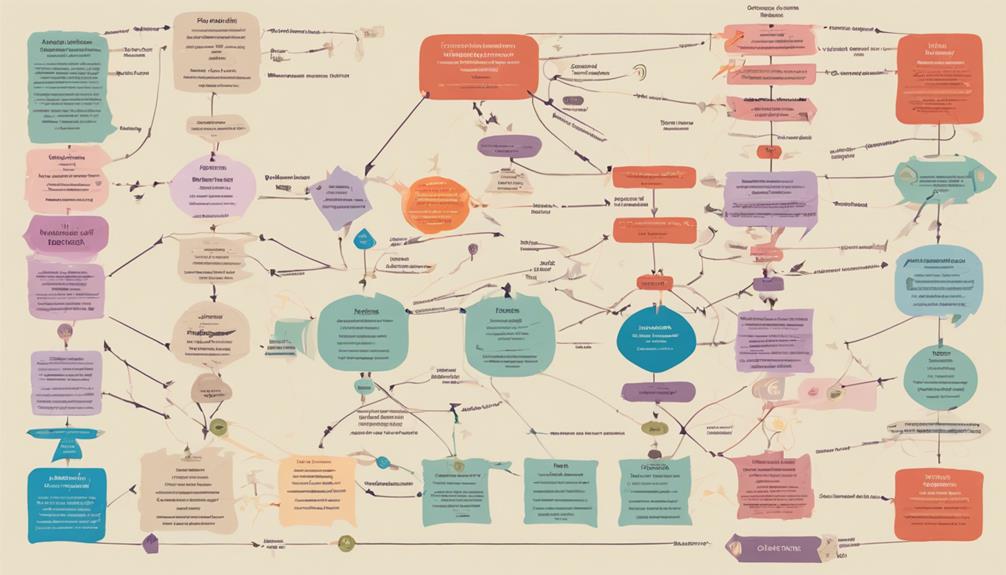When we view ethical non-monogamy as a intricate web of human relationships, intertwined with trust, consent, and empathy, we start to unravel a complex yet fascinating idea.
Exploring the depths of ethical non-monogamy unveils a world where relationships are built on foundations of respect and honesty, challenging traditional notions of love and partnership.
As we navigate this intricate landscape, we are compelled to question societal norms and embrace the diverse expressions of human intimacy.
Key Takeaways
- Ethical non-monogamy involves consensual multiple romantic or sexual relationships.
- Rooted in honesty, open communication, and respect for all partners involved.
- Values transparency, personal boundaries, and mutual agreement.
- Prioritizes clear communication, ethical behavior, and respect for individual autonomy.
Definition of Ethical Non-Monogamy
In defining Ethical Non-Monogamy (ENM), we embrace the concept of consensual romantic or sexual relationships with multiple partners, rooted in honesty, open communication, and respect for all individuals involved. People in ENM relationships have the freedom to explore different types of connections while upholding ethical principles that prioritize transparency and mutual agreement.
These relationships require a deep understanding of one's own needs and boundaries, as well as a profound respect for the needs and boundaries of each partner involved. By fostering consensual and respectful interactions, ENM allows individuals to form intimate bonds that cater to their unique desires and preferences.
Each relationship in ENM is valued for the depth of connection it offers, whether romantic, sexual, or both. People engaging in ENM navigate the complexities of multiple partnerships with grace and empathy, always striving to uphold the ethical values that underpin their relationships.
Principles and Values

Embracing ethical non-monogamy involves anchoring relationships in a foundation of consent, honesty, and open communication among all parties involved. In an ethically non-monogamous relationship, mutual agreement and respect for boundaries are paramount. Here are some key principles and values to consider:
- Transparency: Being open and honest about desires, relationships, and intentions fosters trust and understanding.
- Ethical Behavior: Acting with integrity, empathy, and compassion towards all partners promotes a healthy dynamic.
- Clear Communication: Expressing needs, concerns, and boundaries clearly helps prevent misunderstandings and conflicts.
- Respect: Valuing each person's emotions, autonomy, and decisions is fundamental for maintaining healthy connections.
- Mutual Agreement: Ensuring that all parties involved consent willingly and enthusiastically to the relationship structure supports a harmonious and fulfilling experience.
Types of ENM Relationships
When exploring the diverse landscape of ethical non-monogamous (ENM) relationships, one encounters various types that cater to different preferences and dynamics within partnerships.
Polyamory, for instance, involves engaging in multiple romantic or intimate relationships with the consent of all parties involved, fostering deep emotional connections.
On the other hand, monogamish relationships are mainly monogamous but allow occasional outside sexual relationships, offering a balance between commitment and exploration.
Swinging, where couples swap partners for sexual activities while maintaining their primary relationship, emphasizes shared experiences and trust.
Relationship Anarchy challenges traditional societal norms by prioritizing unique relationship dynamics and individual autonomy.
Lastly, polyfidelity involves multiple individuals within the relationship exploring sex and/or romance together with mutual consent, creating a closed and committed dynamic.
Each of these types of ENM relationships highlights the importance of consent, communication, and respect in fostering fulfilling and authentic intimate connections.
Practicing Ethical Non-Monogamy

Navigating ethical non-monogamy successfully requires a foundation built on clear boundaries, open communication, and unwavering respect for all individuals involved. In ethically non-monogamous relationships, the key to a harmonious dynamic lies in the following practices:
- Establish Clear Boundaries: Setting boundaries and rules with all partners is essential to ensure mutual understanding and respect within the relationship.
- Prioritize Communication: Regular check-ins and open dialogue help maintain alignment, address concerns, and ensure that everyone's needs are met.
- Embrace Honesty and Transparency: Being honest and transparent fosters trust and builds the foundation for healthy relationships in an ethically non-monogamous setting.
- Respect Individual Needs: Upholding respect for each person's feelings and requirements creates an inclusive and supportive environment for all involved.
- Effective Communication: Communication is crucial in navigating the complexities of ethically non-monogamous relationships, fostering understanding and harmony among all parties.
Ethical Non-Monogamy Vs. Cheating
In ethical non-monogamy, consent from all involved parties is a fundamental requirement that distinguishes it from cheating. This emphasis on open communication and respect sets ethical non-monogamy apart from the breach of trust that characterizes cheating. Within the ethical framework of non-monogamous relationships, honesty is valued, and all parties involved are expected to be transparent about their desires and boundaries. Unlike cheating, which thrives on deception and betrayal, ethical non-monogamy prioritizes the well-being of everyone in the relationship dynamic.
When comparing ethical non-monogamy to cheating, it becomes evident that the crux of the matter lies in the presence or absence of consent. While ethical non-monogamy fosters an environment of trust and integrity, cheating erodes the very foundation of a relationship through dishonesty and secrecy. By upholding principles of respect and communication, ethical non-monogamy offers a path that honors the autonomy and needs of each individual involved.
Frequently Asked Questions
What Does It Mean to Be Ethically Non-Monogamous?
Being ethically non-monogamous means embracing consensual relationships with honesty and openness. We prioritize respect, clear communication, and emotional connections. Mutual agreement guides us, making sure boundaries are honored and feelings are valued.
Our journey in ethical non-monogamy is about understanding, support, and growth. It's a path where trust and communication pave the way for deep connections and fulfilling experiences.
What Is Ethical Non-Monogamy for Dummies?
Ethical non-monogamy, often referred to as ENM, is a relationship approach that involves being open and honest with multiple partners, always with respect for everyone involved. It's like gracefully juggling relationships with integrity. By communicating openly and setting clear boundaries, individuals navigate the complex dance of love and connection. In the world of ENM, people embrace the freedom to explore different dynamics and fulfill diverse needs. Ultimately, it's a journey centered on love, respect, and understanding.
What's the Difference Between Polyamory and Ethical Non-Monogamy?
When exploring the difference between polyamory and ethical non-monogamy, it's crucial to grasp the nuances. While polyamory focuses on multiple romantic relationships, ethical non-monogamy encompasses a wider spectrum of consensual non-monogamous setups. Understanding these distinctions can help us make informed decisions about the type of non-monogamous relationship that resonates with our values.
Communication, honesty, and respect are fundamental in both, fostering healthy connections and mutual understanding.
Is Non-Monogamy Unethical?
Is non-monogamy unethical?
It's crucial to understand that ethical non-monogamy hinges on consent, honesty, and respect. Each relationship dynamic is unique, and what works for one may not for another.
By fostering open communication and mutual agreement, we prioritize emotional connections and boundaries. Upholding these values distinguishes ethical non-monogamy from unethical behavior.
It's about fostering trust and understanding among all parties involved.
Conclusion
In embracing ethical non-monogamy, we've discovered a world of boundless love, trust, and growth. By prioritizing honesty and respect in our relationships, we've cultivated a space where everyone's needs are valued and fulfilled.
Let's continue to navigate this journey with compassion and understanding, for in the realm of ethical non-monogamy, our hearts are free to love openly and authentically. Embrace the beauty of ethical non-monogamy and watch your relationships flourish like never before.









